Residential vs. commercial vs. industrial painting: what's the difference?
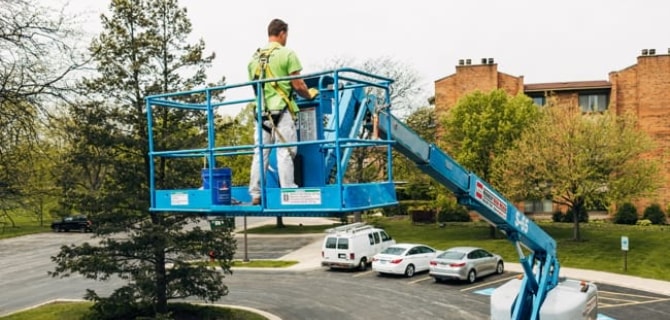
You’ve got a painting project coming up and it’s time to do some research on contractors in your area. You’re looking for a quality contractor that offers a competitive price for their services and does a great job. Is there anything else that matters?
Yes, it’s important to find a contractor that knows what they’re doing and doesn’t charge you an arm and a leg for their expertise, but there is more to finding a quality painter than that. Residential, commercial and industrial painting services differ very much, as each has a specific expertise.
Painting contractors will often serve a niche market, never straying outside of those types of facilities or residence. Before you can find a good partner to help you with your project, you need to determine what your exact needs are and then proceed in finding a contractor that can meet all of your goals and provide value.
Check out the following to figure out which is best for you:
What is residential painting?
A residential painter is one that focuses their energies on houses. They are experts at communicating with homeowners and determining what their exact needs are and even helping them find the right paints (colors included) for each room in the house or for the exterior surfaces.
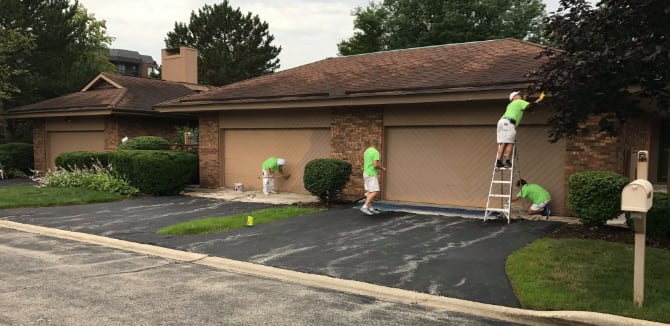
Some commercial properties are set up similar to residences, but the fact is that there are differences. What is residential painting? We cover everything you need to know about residential painting contractors here.
The following are methods residential painters use to get the job done:
Residential painters specialize in projects for homeowners
Residential painters are experts at dealing directly with homeowners, attending to their wants and needs. They know all the tricks of the trade regarding residential painting services and know exactly how to paint all the various surfaces of the home, including interiors, exteriors, garages and decks, etc.
One of the biggest differences between residential and commercial painters is that commercial painters will spend a lot more time painting a variety of different types of surfaces, and their projects are much larger.
Residential painters meet the vision of homeowners
While quality painters always respect the workspace regardless of the structure type, residential painters must be fully cognizant of the fact that their workspace is someone else’s living space.
House painting skills extend to working with the homeowners and family members, ensuring the visual outcomes meet their expectations, as their living spaces need to be of the right color combinations and finishes in order for the project to be considered a success.
Residential painters focus on small-scale projects
Residential painters are accustomed to small-scale projects compared to what commercial and industrial painters experience. This means the materials they use to prep surfaces and apply paint can differ quite drastically. Rarely does the paint type stray from oil-based, water-based and latex-based paints in residential projects.
Painters serving other industries will get into much more complex paint types, which are built to adhere to surfaces uncommon to residences.
What is commercial painting?
While residential painting contractors will stick to serving homeowners, a commercial painter serves businesses where customers will enter. Commercial painting companies are experts at knowing which paints to use on the various surfaces in commercial properties, but they are also quality communicators and know what to expect when dealing with a business owner or a project leader.
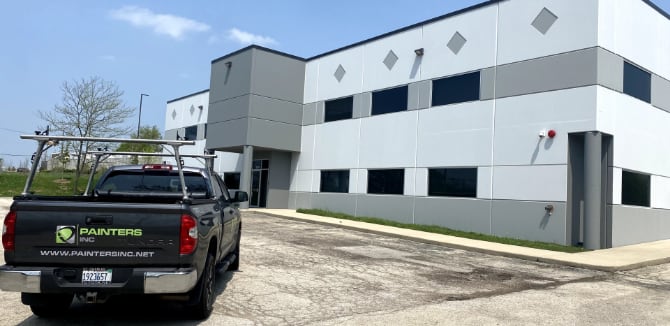
One major aspect that separates residential from commercial is the size of the projects, as commercial jobs can be quite extensive.
These are ways a commercial painting company meets the needs of commercial properties:
Commercial painters specialize in projects for businesses
Commercial painters bring their expertise to a variety of job types, whether it’s a corporate job with strict guidelines in regard to colors and finishes or smaller businesses where there is more flexibility in aesthetic choices.
Commercial painting services from your contractor should be available when they are most convenient to you and your business, as you don’t want to disrupt your business flow or inconvenience your customers.
Commercial painters design for customers
Commercial painters have an eye for the fine details, which is important to business owners who have specific design requirements in mind for the benefit of their customers. These can differ wildly from one business to the next.
For example, the design of a medical facility will likely have little in common with a retail shop’s design. Quality painting contractors will know how to approach each and execute painting services accordingly.
Commercial painters focus on large-scale projects
While commercial painters are known for tackling all types and sizes of projects, there are often times when they need to scale up for larger jobs that require bigger teams.
Commercial painting projects require teamwork, but they also demand using advanced equipment and various tools for use on prepping and painting unique surfaces. Large-scale projects are the norm for commercial painters and they manage them with ease.
What is industrial painting?
What is industrial painting and how does it differ from commercial painting? The biggest difference is appearances and functionality. Commercial painters are focused on aesthetics, whereas industrial painters are focused on providing a layer of protection for the surfaces they paint.
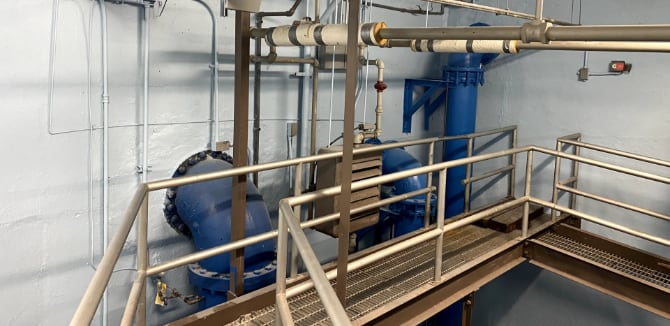
Also, an industrial painter is going to know how to manage intricate ductwork common in industrial spaces, but they also have a deep experience with factory warehouses, storage facilities and machinery. These areas are seldom, if ever, visited by customers, so appearances don’t matter as much.
Here are some ways an industrial painter really stands out:
Industrial painters specialize in protection projects
Industrial painting services will definitely make a facility look nice, but industrial business owners are concerned more about the protective qualities industrial painters offer. Essentially, paint serves as a protective layer, especially on metal surfaces that would otherwise rust. While it’s a perk to have surfaces look nice with a new coat of paint, the function of painting is more about protection than aesthetics.
Industrial painters focus on durability, corrosion resistance and aesthetic appeal in industrial settings
One of the hallmarks of a quality painting contractor is providing services that last a long, long time. Industrial painters are obviously going to make the areas they paint look nice, which covers the aesthetic appeal that customers want, but they are also experts at using the right preparation methods and paint that will offer corrosion resistance.
Industrial painters know exactly when they need to use alkyds, epoxies and mastics. They also know the qualities of urethanes and fluoropolymers and when they can be utilized. Having this knowledge of what types of surfaces in specific types of conditions will require specific types of paints is something only expert industrial painting contractors can offer.
Industrial painters offer more specialty services
Industrial painters are qualified to handle the common tasks in industrial facilities, but the best contractors can offer a wider array of specialty services. For example, industrial painting projects could involve machinery that needs to be painted or garage areas or metal support structures, including bridges that require attention.
Painters with a wealth of knowledge about surfaces and the paints that protect them in the industrial setting provide a great service, ensuring that the client will not have to seek out help from multiple contractors.
Residential vs. commercial painting
Commercial painting and residential painting contractors are two separate entities, but what is the difference between residential and commercial painting? You might think that paint is paint, a brush is a brush and they all are applied the same way. The truth is that there are many differences because there are many types of paint, different types of surfaces and many different ways to apply paint.
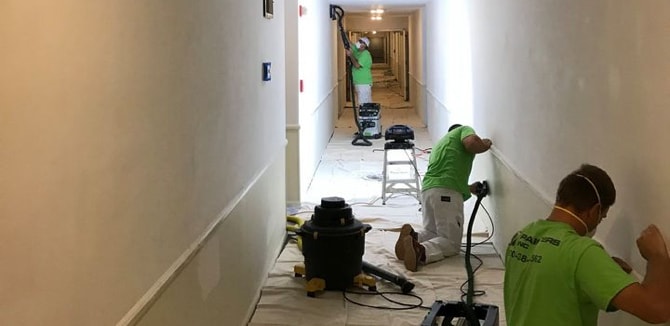
First and foremost, commercial work is usually much more involved in terms of size and scale. While some homes are quite large, they pale in comparison to the size of most commercial facilities. This means there is less prep time with residential, smaller teams to tackle the work and a shorter timeframe for the project to be completed.
While some commercial painting jobs might be similar to residential in terms of the surfaces being painted, most commercial projects will involve a variety of surfaces in areas that require special needs.
The main differences between commercial and residential painting
The size of painting project
Most commercial projects will involve a large space or several separate spaces that require the contractor to have some unique skill sets, such as painting machinery, bridges or concrete. Residential projects are almost always limited to either interior and/or exterior work on a home and perhaps a detached garage.
Commercial painting can involve any number of different industries, from healthcare to education to retail. One similarity between residential and commercial work related to apartments or condominiums is that some of the surfaces are the same, but the commercial projects are much larger and can also involve extensive fire escape and staircase painting.
The number of painters involved
To meet expectations related to finishing a project on time, commercial painters have larger teams than residential painters. While commercial projects might take longer to complete than residential, the larger number of painters ensures that all deadlines are met.
The quantity of paint
Commercial projects involve larger facilities with more square footage of surfaces that need to be painted than what residential painters deal with. And because of this, commercial painters bring much more paint to the job. The only caveat is that quality paint can cover more area than bargain paint. In either case, only work with a contractor that uses the best paints, as they look better and last longer.
The materials and equipment
The paints and materials used by residential painters differ little, if any, from what DIY painters use. From step ladders to drop cloths, rollers to paint brushes, paint trays to stirrers, the materials remain the same. Furthermore, quality paints, such as Benjamin Moore and Sherwin-Williams, are also readily available to homeowners who want to do the work themselves. However, residential contractors, having more knowledge of the different types of paint and finishes, will not make mistakes that some homeowners make in purchasing paints, and professionals will also work faster, but more efficiently.
Commercial painters are tasked with a much more difficult job of selecting specialized paints for unique surfaces that could be that are not present in a residence. Furthermore, commercial painters use special tools for prepping surfaces and painting them.
Painting services provided
Residential painting contractors are experts at dealing with the wants/needs of homeowners. They can help them select the right color combinations for their interiors and exteriors, as well as the correct finish for each type of room.
The services provided by commercial painters are quite different. While the communication aspect is important in commercial work just as it is in residential work, commercial painters offer specialized services related to prepping and painting a much larger area, which means they will utilize different tools and will focus on cover as much areas as they can as fast as possible while also paying attention to the fine details.
Typical residential painting services include:
- Exterior and interior painting
- Cabinet painting
- Wallpaper removal and hanging
- Plaster and drywall repair and painting
- Deck and fence painting
- Garage painting
While commercial painters will deal with some similar surfaces as residential painters, they are often more skilled at preparation of unique surface materials, such as sandblasting, and applying epoxy coatings, metalizing and numerous other services that residential painters never encounter.
In addition to interior and exterior painting, other commercial painting services include:
- Structural metal surface painting
- Line striping
- Brick waterproofing
- Concrete ceiling repair
- Joint expansion sealing
- High-durability coatings
- Roof coatings
- Waterproof coatings
Painting project scheduling
All painters find scheduling very important, but the tasks can be more involved for commercial painters. A big difference is that most residential painters will stick to a Monday through Friday schedule, taking the weekends off as families enjoy their space on Saturdays and Sundays. Quality residential contractors will also offer flexibility to their clients, which could include working weekends to get the job completed faster, but only at the homeowner’s request.
Business operations often dictate when a commercial job is scheduled, which could be nights and/or weekends. When downtime is not an option, commercial painters must carry out their tasks in such a way that does not impede business. They must be ready to adapt to any situation, such as reporting to a retail shop when they are closed so as not to disturb customers.
Painting project management
It’s not unusual in a commercial space for painting to be one of many improvements going on at the same time, which means product management in these spaces focuses on productivity and efficiency. Project leaders are on a tight, strict schedule and they need their contact person with the painting company to commit to their schedule and perhaps even communicate with other contractors to ensure everything is syncing.
Project management in residential work is important, but far less involved and much more relaxed. While homeowners will usually insist on getting the project completed as discussed, there are far fewer factors involved that could cause delays.
Painters experience
The most important part about selecting a contractor, whether they are residential or commercial, is that they are experienced. Given the vast variety of different commercial properties out there, commercial contractors need to have far more experience to be a viable choice for all types of businesses.
While residential contractors are experienced at helping homeowners select the right paints, prep areas and protect landscaping, commercial contractors need to be well-versed in a variety of safety measures, as they take more risks, mostly associated with working on high, out-of-reach areas. While residential painting can be a DIY project for the homeowner, it is recommended that a commercial project involve professional painters.
Compliance with safety regulations
Residential painters might need to be knowledgeable about permits, but they don’t have the same compliance and safety regulations to worry about as commercial painters. Residential painters need only worry about their relationship with the homeowner, whereas commercial painters are working in large and complex environments where there are many moving parts and far more risks.
Running afoul of OSHA regulations or any compliance and safety issue regulated by local, county or state governments is something no commercial painting contractor can risk, as there are likely fines involved and infractions are definitely not good for the reputation of the contractor. Quality commercial contractors constantly train their crews on safety and they invest in the best equipment to prevent injuries.
Painting project budget and labor requirements
Some residential painters will estimate the cost of a job on the amount of hours it will take to complete, while others have a flat rate they offer each client. There can be a recurring relationship between the homeowner and the painter where the painter who has done exterior work and will come back to do interior work later, or vice versa, but committing to a long-term relationship is not the norm.
Commercial painting projects, being much larger, are not always estimated by the number of hours it will take to complete. Rather, the contractor will offer a bid for their painting services based on the size of the job and the types of surfaces being covered. Some work will be completed in phases, which leads to a long-term relationship where the contractor will return to tackle different jobs for the client over a long period of time.
The work required of residential and commercial painters differs quite a bit, as each is responsible for far different tasks. Commercial painters must have a vast knowledge of which specialty paints go on specific types of industrial surfaces. In comparison, residential painters have much less of a responsibility in that regard, but that’s not to say they don’t run into their own unique set of challenges. In any case, the customer expects a job to be done right and on time and that’s something all painters specialize in.
Commercial vs. industrial painting
What is the difference between commercial and industrial painting? While an industry facility is a place where commerce is carried out, it’s important to note the distinction in commercial vs. industrial painting.
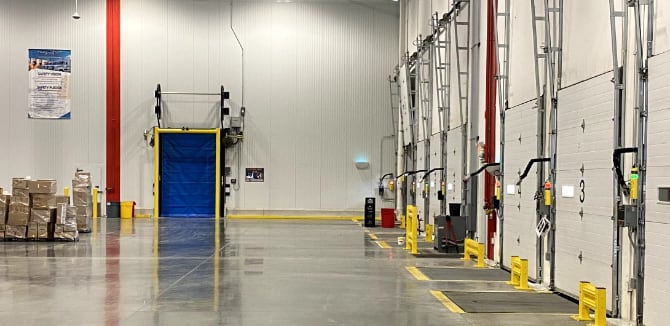
Commercial and industrial painting projects are each carried out by proven professionals who have amassed years of experience, but they are different in that a commercial facility is one where customers are present much of the time. The best example would be a retail store where a paying customer visits at any hour of the day.
An industrial painting contractor is one who focuses on facilities where production is the task at hand. There is no need to impress a customer in these facilities with a perfectly matched color palette, because industrial facilities rarely, if ever, see a customer, so it’s all about the functionality of the paint and how it will perform and protect. Industrial painters are experts at applying paint that will stand up to harsh environments.
The main differences between commercial and industrial painting
The different type of painting project
Commercial facilities need to be painted so the customer is happy with what they’re seeing. There’s even some psychology involved in paint colors, as colors can elicit different emotions. Furthermore, color choices matter in branding, which is also important to consider in commercial painting projects.
Commercial painting projects include:
- Office painting
- Healthcare & medical facility painting
- Restaurant & hotel facilities painting
- Warehouse painting
- Retail shops painting
- Bank painting
- Church painting
- School and college painting
- Parking garage painting
- Gym and fitness centers painting
Industrial painters are called out to tackle tough jobs at everything from factories to warehouses to bridges, which is where they encounter numerous surface types, including anything from structural steel to pipes. While some painting will involve using specific colors to adhere to safety regulations, the look of the paint in an industrial facility is almost always secondary to its function as a protective layer.
Industrial painting projects include:
- Factory painting
- Structural steel painting
- Industrial tank & silo painting
- Industrial piping system painting
- Industrial equipment painting
The different goal of painting
Commercial and industrial painters work for a business when they take a job, but they definitely have little in common after that, as their goals are quite different. When you think of commercial painting, you should think of things like storefronts and offices. Anyplace a customer will show up to do business is where commercial painters will go to work. Their goal is to cover surfaces with paints that will be comfortable and welcoming to customers (as well as boost employee morale).
Industrial painters are not going to seek out jobs where customers frequent. Rather, they are focused on settings where production is the goal and a customer will rarely, if ever, enter. The bulk of these facilities are factories and warehouses. The goal of industrial painters is to cover surfaces so they are protected.
The different methods of painting
Commercial painters have a method of applying paint that makes it look pleasing to the customer, is streak-free and will hold up to frequent cleanings in high-traffic areas, but will always be of the right color combinations so that the rooms feel comfortable and pleasant.
Most business owners want the painting crew in and out as fast as possible so business is not disrupted, so the fast-drying latex paint is the most popular type utilized for these jobs. While oil-based paints are more durable and last longer, they take too long to dry for most commercial spaces.
While industrial painting also adheres to a timeline that pleases the customer, the paint needs to be highly durable and stand up to the harshest environments, which means paints that take longer to dry are more commonly used. Furthermore, the color of these paints is always secondary in importance to their ability to protect surfaces in industrial areas.
Industrial crews will also utilize more safety gear than commercial painters, as they’re painting difficult-to-reach surfaces that can require cranes and other specialized equipment. Another difference is that industrial painters are more adept at painting floors, which generally requires epoxy coatings, as well as other techniques that can help route traffic in these highly traveled areas (forklifts, hand trucks, foot traffic, etc.).
The different aspects of painting durability and aesthetics
If an industrial painter is asked what their priority is in one word, they’re likely to answer, “durability.” Do they care about the look of a project? Of course, but their #1 priority is to protect surfaces, which is why they know so much about the hardiest painting products on the market today and the types of surfaces that require them.
Industrial facility owners want their project to last a long time, which is a big ask in areas where caustic substances, heavy traffic and the risk of wear and tear is significant, but that’s why industrial painters are so focused on durability – they only use top-end paint and the right tools of the trade to get the job done correctly. While aesthetics are not lost on this type of contractor, they know they will be judged by how long their work holds up and that becomes their focus.
Painting projects are a considerable investment, but regardless of whether you’re in need of commercial or industrial painting experts, there is a lot of value in partnering with one that brings quality to the project. While the goals of each type of contractor differ, they each offer a solution to their clients that will not be needed again for years to come.
As you research the painting contractors in your area, be sure to partner with one that has experience working with a facility like yours. This will make it easy to determine if the contractor has a commercial or industrial focus. Always ask for references and don’t pick the lowest bidder, as their skills are questionable and the outcomes will leave a lot to be desired.
What painting contractor do you need for your project?
Now that you know the differences between an industrial and commercial painting contractor, it’s time to begin looking for a contractor that can manage your project. If you’re a business that welcomes customers to your storefront, you need to seek out a qualified and proven commercial painting contractor. If your facility is a factory or warehouse where production is the sole purpose, search for a trusted industrial painting contractor.

The commercial painter you choose will be an expert in matching different colors and finishes that match your preferences and will be warm and welcoming to your customers. An industrial painting contractor is going to match you with the highest-functioning paints that will hold up to harsh environments, protecting your surfaces for years to come.
If you have any questions, be sure to contact us at Painters Inc. We have served the Chicago area with commercial and industrial painting services for going on two decades, so we’ve got answers to all of your questions.









